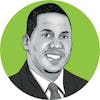 See
more of the story
See
more of the story
On a bright day in Minneapolis last month, Officer Jamal Mitchell responded to his final call.
The body cam footage recently released showed Mitchell as he approached 35-year-old Mustafa Mohamed, who appeared to be wounded and had allegedly been involved in a violent incident involving two victims in a nearby apartment complex.
Mitchell quickly grabbed a pair of blue plastic gloves and prepared to help. He did not know Mohamed would soon brandish a weapon and begin to shoot, killing the 36-year-old father of four before Mohamed was also killed by responding officers.
"Squad 512," Mitchell said before that moment. "It looks like we have at least two victims outside at the location, bleeding."
Then he walked toward Mohamed. ·"Who shot ya?" Mitchell asked. "Who shot ya? Are there victims inside?"
I mourned Mitchell's death. He was a young Black man with a family, a fiancée and a future. And by all accounts, his intentions were honorable. I don't know how Black officers see themselves on a police force with the history that Minneapolis' department possesses, but I can only assume it's not possible to accept the job without an understanding of its detrimental legacy throughout the Twin Cities.
Mitchell, according to those who knew him, left his hometown of New Haven, Conn., to make an impact in Minneapolis with a full understanding of the department's challenging relationship with the community it serves.
When I first saw his picture after he was killed, he looked familiar. I don't know if I ever met him, but perhaps we'd crossed paths at a Vikings game, where he worked security, or maybe at a barber shop nearby or elsewhere in the Twin Cities. At his funeral in New Haven, his colleagues, friends and family members said Mitchell intended to do his job as a community member who recognized the challenges within his profession.
On the body cam footage at the end of his life, he sounded like someone who cared.
Amid her family's devastating loss, Tori Myslajek — his fiancée — tried to make sense of everything she and their children had just endured.
"Jamal was our whole world," she said in a statement.
He died in his attempt to do a good deed and assist someone he believed needed aid.
His passing was also a reminder: Bullets do not discriminate. While some have used his death to make grandiose assumptions about the state of policing or the need to do more to empower officers, the foundational dilemma has been overlooked.
There is a problem with guns. Here. There. Everywhere.
The concern is so dire that Dr. Vivek Murthy, the U.S. surgeon general, called on lawmakers to ban "assault weapons and large-capacity magazines for civilian use" — among other reforms — as he declared gun violence to be a public health crisis last week, per the Associated Press.
While the full details of Mohamed's actions that day remain unclear, he had a violent history involving weapons. In that video before he, too, lost his life after his assault on Mitchell, he had allegedly walked into the street in a residential neighborhood ready to hurt anyone in his path.
And that is our challenge.
Mitchell's death was tragic. But the scenario was familiar. Aniya Allen was sitting in a car with her mother when a stray bullet struck and killed her in Minneapolis. She was only 6 years old. Deshaun Hill, the Minneapolis North star quarterback, was just 15 when a man killed him as he walked near the school. Kesha Latrice Moore was only 43 years old when her estranged boyfriend allegedly shot and killed her in her Linden Hills apartment in December.
We cannot elevate some shootings over others because of a person's occupation or role in a community. They were all incredibly impactful for those who loved them. Their families and friends shed the same tears.
Mitchell's death confirmed the only meaningful, universal truth in these situations: Anyone in the Twin Cities, it seems, can become a victim of gun violence.
"We know that attacks on police officers are on the rise in Minnesota and across the country and Jamal just happened to be the latest victim of this senseless and troubling trend," Minneapolis Police Chief Brian O'Hara said outside the hospital following Mitchell's death.
"It has become too easy to attack our police and it needs to stop. The policing profession is different than other jobs. As police officers, we know that dying in the line of duty, making that ultimate sacrifice, is always a possibility. But the harsh reality hurts deeply when it actually happens."
During that news conference, I thought O'Hara missed an opportunity to do what he said he'd hoped to do when he first took the job: empathize with the community facing an even greater vulnerability every day while also enduring the impact of a police department with a documented history of violence.
The proliferation of guns is the real challenge and none of us is spared.
Until that is the most pressing priority for all, however, we will collectively continue to face these destructive scenarios. As a result, folks throughout every community will have to digest these tragedies and wipe their eyes — before some of them decide to take sides in a dialogue about gun violence.
Only the guns — and those willing to wreak havoc, indiscriminately, against all — seem to be on the same page.



![Kerasotes Showplace ICON Theatre at West End located at W 16th St and Park Pl Blvd, St. Louis Park, MN, on April 12, 2013. ] JOELKOYAMA‚Ä&](https://arc.stimg.co/startribunemedia/DVRTUZ4Y2Q2QOEJRUH4H7LIGVM.jpg?w=75&h=75&fit=crop&crop=faces)


